Tag Archive: aphasia
June 17, 2013
by Carole Zangari -
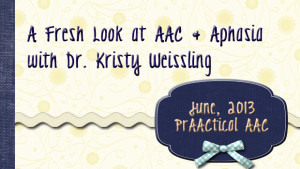
We’re so pleased to be able to share the thoughts of our friend and colleague, Dr. Kristy Weissling, on providing AAC supports to people with aphasia. She received her professional doctorate from Nova Southeastern University and is currently an Assistant Professor of Practice and clinical supervisor at the Barkley Speech-Language and Hearing Clinic at the University of Nebraska-Lincoln. Her research and teaching interests include, aphasia, cognitive communication impairments, and AAC. She participates in implementation of a portion of the RERC grant project at the University of Nebraska-Lincoln. She has been an instructor in aphasia and cognitive linguistic impairments for 15 years and teaches in both online and live formats. Her clinical load includes individual and group treatment of individuals with aphasia, traumatic brain injury, and early cognitive decline. In this post, Kristy reflects on three articles that have shaped her clinical services and teaching. :::::::::::::::::::::::::::::::::: I have been working with people who... [Read More...]
Filed under: PrAACtical Thinking
Tagged With: aphasia, EBP, Fresh Look, Kristy Weissling, research
June 16, 2013
by Robin Parker -
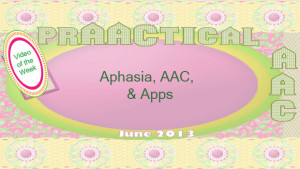
Check out these Aphasia Apps in Action Small Talk Apps by Lingraphia-Free now Business, Aphasia, AAC, & a Small Talk App About Small Talk My ChoicePad Makaton Symbols
Filed under: Video of the Week
Tagged With: aphasia, Apps
June 15, 2013
by Carole Zangari -
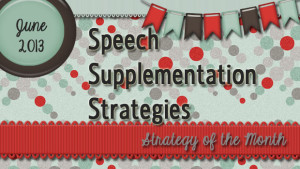
Anyone who has had a conversation with someone affected by aphasia is probably familiar with the ‘20 Questions’ approach to resolving communication breakdowns. Asking questions helps us take the piece of the message we understand (or think we do!) and build on that to gain more insight into the communicator’s intent. Take this exchange between a woman, Sandy, and her mother-in-law, Joan. Joan had a stroke a few years back and has both aphasia and dysarthria. Joan: “Gay” Sandy: “Gay? What do you mean, mom? Someone’s gay?” Joan: Shake head. “Gay” Sandy: “I’m not sure, mom. Gay?” Joan: “Gay” Points to the front door Sandy: “Kay? Are you telling me about Kay from across the street?” Joan: “Gay.” Nods Sandy: “What about Kay? Did she call?” Joan: Shakes head no Sandy: “Do I need to call her?” Joan: Shakes head no Sandy: “Did she stop by?” Joan: “Aaadihdih” Sandy: “Did... [Read More...]
Filed under: Strategy of the Month
Tagged With: alphabet supplementation, aphasia, speech intelligibility, supplementation strategies, topic supplementation
June 9, 2013
by Robin Parker -
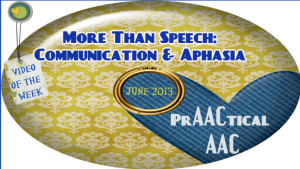
Life is Larger Than… APHASIA is the title of the Aphasia Institute’s 30th anniversary video made by group members, volunteers, and staff. Although life is larger than… APHASIA, the power of communication and sharing stories is so apparent. Enjoy the video, but check out the Aphasia Institute’s website for resources, information and a visual support for understanding the mission: “Giving hope to people with aphasia and their families by developing and sharing innovative solutions that reduce language barriers to full life participation”.
Filed under: Video of the Week
Tagged With: aphasia, communication
June 8, 2013
by Robin Parker -
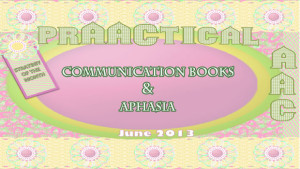
We know aphasia intervention has moved well beyond traditional speech and language training and intervention. We are so happy it has moved to an authentic participation, functional communication, and social interaction focus. Communication books are one tool for helping people with aphasia be active participants in conversation and comprehensive communication. Here are some thoughts and ideas about communication books to get started. Communication Books- Communication books for adults with aphasia can be in grid format with relevant communication messages. There can be a few pages or many, but keep in mind that the more pages, the longer it will take to navigate. It is most important to include high priority and relevant messages that will support needed communication and not just ‘standard’ messages. There are many samples and templates that can be purchased or downloaded for adult communication books. These may be good as a start, but should be individualized when... [Read More...]
Filed under: Strategy of the Month
Tagged With: AA, aphasia, COmmunication Books
June 3, 2013
by Robin Parker -
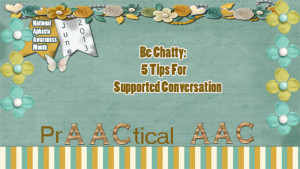
There are many strategies to support communication and conversation for individuals with significant aphasia. Conversation is about connecting with people. We engage in conversation about interesting and relevant experiences to help with connecting. To best connect and be part of conversation, there needs to be comprehension and expression from each communication partner. With aphasia, there is difficulty in these language areas, but it is not that language is lost, it is that it needs to be accessed differently. These quick start tips will support accessing conversation and connections. Write or Draw Key Words– When you are talking, write key words to support your spoken language. Gesture Key Words– When you are talking, supplement spoken language with gestures to illustrate a main point Show Related Photographs or Remnants– While you are talking, use photographs or some remnant of the an experience or event you are talking about. Written Choices to... [Read More...]
Filed under: PrAACtical Thinking
Tagged With: aphasia, augmented comprehension, augmented input, Supported Communication
June 2, 2013
by Robin Parker -
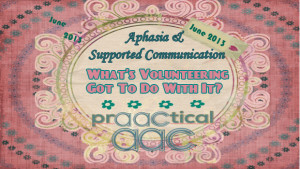
Awesome Volunteer Program- Communication Partners & Supported Conversation….
Filed under: Video of the Week
Tagged With: aphasia, Supported Communication
June 1, 2013
by Carole Zangari -
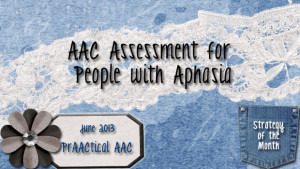
Many people with aphasia fail to regain sufficient speech and language skills to meet their communication needs. With more than one million people with aphasia in the US alone, chances are most people reading this know at least one person affected by the disorder. While many go on to regain functional speech and language skills, some remain unable to communicate well enough catch up with a neighbor, talk about bills with a spouse, ask a question in a store, play with a grandchild, or tell their healthcare providers about side effects or symptoms. It’s hard to really imagine how devastating and isolating this experience may be. Aphasia Awareness Month seemed like the perfect time to reach out to SLPs with information on AAC for people with aphasia. In this post, we’ll share some thoughts and resources on assessment. Assessment activities are, of course, driven by the purpose for which the... [Read More...]
Filed under: Strategy of the Month
Tagged With: aphasia, assessment, Joanne Lasker, Kathryn Garrett, MCST-A
February 10, 2013
by Carole Zangari -
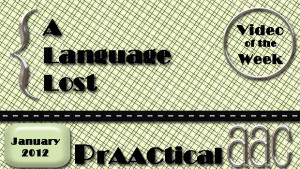
In this week’s video, Dr. Melanie Fried-Oken discusses how AAC can benefit individuals who are losing their language abilities due to Primary Progressive Aphasia (PPA). She reviews the disorder, provides great examples, and clearly explains AAC strategies that can be used to support these patients. We love the skillful way in which Dr. Fried-Oken balances current research with prAACtical guidelines for goals and therapy in this helpful video.
Filed under: Video of the Week
Tagged With: aphasia, primary progressive aphasia
October 23, 2012
by Carole Zangari -
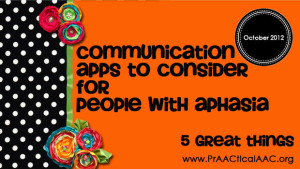
It’s hard for most of us to imagine the experience of having had language all your life and suddenly losing it. Here are some ideas for apps that may be useful in your therapy with people with aphasia. Scene and Heard from tBox Apps and Scene Speak from Good Karma Apps: We’d love to see more people with significant language deficits use visual scene displays to communicate. Lingraphica’s Small Talk Series and their TalkPath apps: Worth exploring these apps as they were designed expressly for this clinical population. Tactus Language TherAPPy apps: Looking for apps that will help your patient develop and practice language and writing skills? Tactus has several to explore. Pictello from AssistiveWare: There is great power in storytelling and one of the things missed most by people with acquired communication disorders is their ability to connect with friends and family. This app has great potential for sharing... [Read More...]
Filed under: PrAACtical Thinking
Tagged With: aphasia, Apps, Emergency, narrative, stroke









